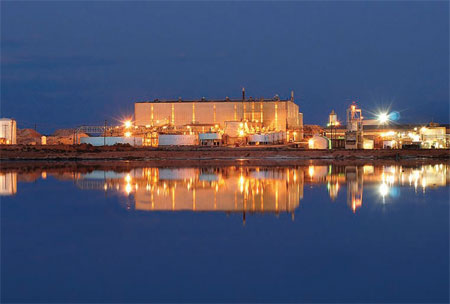By John Rogers
Energy Fuels Inc. is refining the little-known metal vanadium at its White Mesa Mill south of Blanding for the first time since 2013. Best known as the only operating conventional uranium production facility in the United States, the White Mesa Mill discontinued processing vanadium as prices for the metal fell below commercially viable levels about six years ago.{mprestriction ids="1,3"}
After falling below $5 per pound in 2013, vanadium was selling at $28.75 in November before falling back to about $15 last week. Energy Fuels executives said that their current vanadium production is still profitable at that price. The company estimates that the tailing ponds contain about 4 million pounds of recoverable vanadium.
The current recovery effort reclaims vanadium pentoxide (V2O5) from tailings pond solutions at White Mesa related to uranium processing. Earlier this month, the mill produced its first batches of vanadium concentrate, also known as “black flake.” The company said it may achieve full production rates of 200,000 to 225,000 pounds of vanadium pentoxide per month by the end of the quarter.
“We are extremely pleased with the quality and purity of our initial batches of finished vanadium product,” said CEO Mark S. Chalmers in a statement. “Energy Fuels is the newest vanadium producer in the world to respond to today’s relative market strength and we are now one of the only vanadium producers in North America.”
Vanadium is a strong, malleable metal that is used primarily as an additive to other metals to increase strength significantly. Recent demand is being fueled by new Chinese regulations for steel strength in buildings and infrastructure which came about following a 2008 earthquake that devastated part of the country. Vanadium is also mixed with aluminum for use in jet engines and nuclear power plants as well as dental implants.
Energy Fuels also said in the press release that it has begun several initiatives to enhance its ability to respond to improved uranium market conditions that may result from an ongoing Section 232 uranium investigation in the U.S. or a boost in the global uranium market fundamentals. The U.S. Commerce Department is conducting an investigation under Section 232 of the Trade Expansion Act of 1962 to determine if uranium imports are undermining national security.
Energy Fuels and Littleton, Colorado-based Ur-Energy Inc. are asking Pres. Donald Trump to impose a quota that would reserve 25 percent of the U.S. market for domestic uranium producers. Energy Fuels plans to invest about $4.2 million in 2019 in improvements to its uranium mines and transportation infrastructure to prepare for possible increased uranium demand.
Both uranium and vanadium appear on the government’s “mineral commodities considered critical to the economic and national security of the United States,” according to the “Final List of Critical Minerals” published in May 2018.
“We expect to continue to ramp-up vanadium production in the coming weeks,” said Chalmers. “Even though current vanadium prices of $15.50 per pound have dropped off of their November 2018 highs of $28.75 per pound, markets remain strong and have stabilized in recent weeks. Vanadium markets can be extremely volatile, but we believe the relative strength we’re seeing in today’s vanadium market is likely to continue throughout 2019, and potentially into 2020. Energy Fuels should be able to generate substantial revenue under current and expected vanadium market conditions.”
Should market conditions continue to fluctuate, Chalmers said the Energy Fuels is prepared.
“In addition, now that we have upgraded the mill’s vanadium circuit and proven-up the chemistry required to process the tailings solutions, we can be extremely flexible in our current and future vanadium production. We now have the ability to halt, and later resume, vanadium production from pond solutions within a matter of days and at little to no cost to us in response to evolving market conditions. While our initial results are outstanding, we expect to continue to refine our processes to potentially improve purities and product quality to even higher standards.”
The White Mesa Mill employs approximately 150 in Utah’s San Juan County. It was constructed in 1979. Energy Fuels bought the mill from Denison Mines Corp. in 2012 for company stock valued at about $107.1 million.{/mprestriction}








